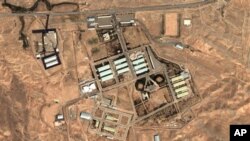Here are the key players and their stances going into Saturday's talks between Iran and world powers over Iran's controversial nuclear program:
Western nations fear Iran is trying to develop a nuclear weapon, which requires enriching uranium to more than 90 percent.
IRAN
Tehran has sent mixed signals, hinting toward a compromise while warning against pressure. Iran's chief nuclear negotiator Saeed Jalili says Tehran will present new initiatives at the talks, but warned that efforts by Western nations to exert pressure would "backfire."
Fereidoon Abbasi, head of the Iranian Atomic Energy Organization, has said that enriching uranium above the 20 percent level needed for the Tehran research reactor is not a long-term goal for Iran. He said enrichment could eventually be dropped to the 3.5 percent level needed for nuclear power generation.
However, Hossein Sheikholeslami, a former Iranian ambassador to Syria, has said Iranians regard uranium enrichment as "our inalienable right” and warned not to expect any enrichment freezes.
RUSSIA AND CHINA
Russia and China see international sanctions as ineffective and a move that only makes Iran "more stubborn," as Russian Deputy Foreign Minister Sergei Ryabov said Tuesday.
China's Foreign Ministry said in a statement Tuesday that it hopes all parties will "show flexibility and sincerity in the dialogue, to open a constructive and sustained dialogue process."
UNITED STATES
The U.S. is hoping for a diplomatic solution while showing signs of slowly running out of patience.
U.S. Secretary of State Hillary Clinton said Wednesday "there is still time for diplomacy" to resolve the nuclear dispute, adding that the talks provide an opportunity for Iran to "address seriously" the international community’s concerns.
Other U.S. officials have said the U.S. will demand that Iran halt higher-grade uranium enrichment and immediately close its Fordo underground nuclear facility.
President Barack Obama has said "all options are on the table" to keep Iran from obtaining a nuclear weapon, including the "military component."
BRITAIN, FRANCE and GERMANY
France is pushing for a total halt to Iran's nuclear program, not just Iran's higher-grade uranium enrichment.
Along with the U.S., the European Union is demanding that Iran dismantle its underground nuclear facility. A spokesman for EU foreign policy chef Catherine Ashton said this week that she hopes the talks in Turkey "produce a conducive environment for concrete progress."
The EU has joined the U.S. in imposing oil and financial sanctions on Iran beyond the sanctions levied by the U.N. Security Council.
The White House says French President Nicolas Sarkozy and President Obama agreed Thursday to continue increasing pressure on Iran through sanctions and other measures if Tehran remains unresponsive.
ISRAEL
While not a party to the talks, Israeli leaders say a nuclear-armed Iran would be a threat to Israel's existence and they have threatened military action to stop Tehran from getting close to developing a nuclear weapon.
News
Key Players in Iran Nuclear Talks Make Varying Demands
- By Carla Babb






